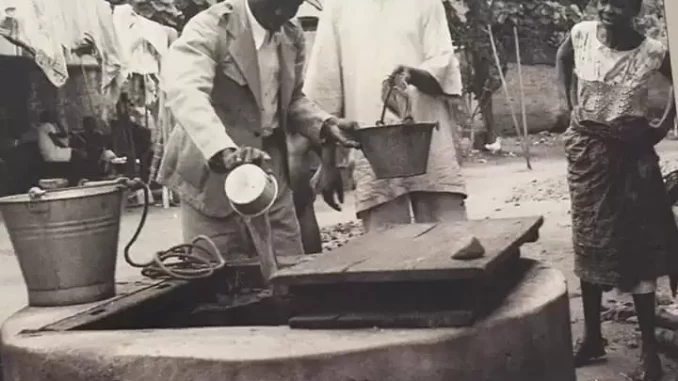
Known as ‘wole-wole’ in Yorubaland, ‘Nwaole-ala’ among the Igbos and ‘duba-gari’ among Hausa people, sanitary inspectors are government officials saddled with the responsibility of overseeing the sanitation of houses and neighbourhoods in every part of Nigeria.
The office of the sanitary inspector was established during the colonial era of Nigeria. At the dawn of their establishment, they were known as sanitary attendants because their primary function then was to serve as helping hands to colonial masters (sanitary inspectors) who execute sanitary duties themselves.
On a clearer note, colonial masters who oversaw sanitization were called ‘sanitary inspectors’ while Nigerians who worked under them were referred to as ‘sanitary attendants’.
The sanitary attendants handled meagre duties such as marking tall or bent trees, noting dilapidated buildings, pasting announcement or warning bills, interpreting for colonial masters, etcetera.
As time went on, the sanitary attendants were assigned more professional functions such as daily sanitary inspection, collection of water samples, noting mosquitoes’ breeding sites and so on.
Many of the sanitary attendants improved their education level and thus earned more recognition for their office. They began to execute functions such as felling tall trees that were close to residential buildings, identifying infectious disease cases, disinfection and disinfestation, liaison between the colonial masters and villagers, verification of notices issued by their colonial masters (sanitary inspectors), retention of daily, weekly and monthly returns and others.
In the 1920s, Dr Isaac Ladipo Oluwole played a crucial role in improving the status of Nigerian health workers, including the partly recognized sanitary attendants.
Dr Oluwole returned from Britain as a public health physician and became the first African Medical Officer of Health (MOH) in the Lagos colony. In 1920, he established the Nigerian School of Hygiene in Yaba, Lagos, which was the first of its kind in Nigeria and trained qualified people to become sanitary inspectors.
During this period, the sanitary attendants were now referred to as sanitary inspectors and were put in charge of:
- Routine sanitary inspection of houses, markets, schools and communities.
- Waste disposal and environmental sanitation, pollution control and industrial sanitation.
- Water sampling and sanitation.
- Port health duties (air, land and seaports)
- Control of communicable disease (infectious diseases).
- Building and urban planning.
- Vector and pest control e.g. Malaria control.
- Prosecution of public health offenders in the court.
- Meat and food inspection.
- The disposal of the dead (corpses).
- Occupational health and factory inspection.
- Vaccination/inoculation of both schoolchildren and adults.
- Health education on personal and public hygiene.
They were dreaded by all and sundry, even more than the then colonial police officers, because breaching their orders was breaching the system, so people avoid getting into their trouble net by tidying up their environments.
Another factor that improved the status of the sanitary inspectors was the establishment of World Health Organization (WHO) in 1948 as people with a higher level of education joined the profession.
In 1988, the name of the profession was changed to environmental health officers in line with the internationally accepted name of practitioners of the profession and also to accommodate members of the profession who graduated from the university with a degree in public health, environmental health and epidemiology.
Fast forward to recent years, the present situation of the sanitary inspectors in Nigeria is disheartening as little regards are given to them and their functions. The profession is withering away at an increasing spate and people now tag it ‘old-school’ while some are not even aware of their (sanitary inspectors now environmental health officers) existence…..Seê _ Morê

Leave a Reply